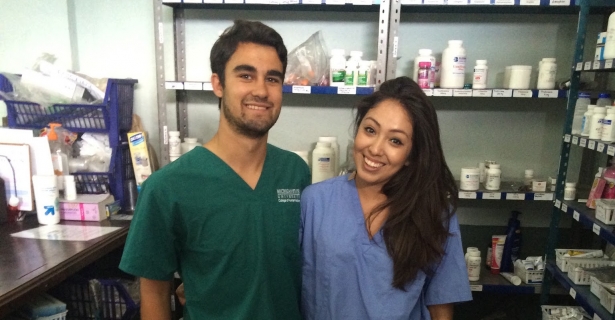Aside from the beautiful volcanoes, vast rainforests, ancient Mayan sites, and delicious traditional plates, Guatemala still suffers many of the devastating effects of the 36-year long civil war that ended in 1996. There are many consequences resulting from the widespread human rights violations that took place during those years. Poverty sweeps the nation with only 65% of the population having basic services including a source of water, housing, and a latrine. With poverty, comes an increase in hunger and malnutrition. Guatemala is the Latin American country with the highest malnutrition rate and the second highest rate of malnutrition worldwide. Malnutrition increases the risk for various health problems. This issue is compounded by the lack of medical providers, especially in rural indigenous communities, and the high costs of medical services even for those in close proximity of a doctor. This summer, we are volunteering in Xela, Guatemala, which serves as the cultural and commercial center for a great number of Guatemala’s indigenous population.
Pop Wuj is the name of a cooperative non-profit organization dedicated to various community development projects in Xela, Guatemala and the surrounding area. Along with other services, they operate a medical clinic that provides free and very low cost consults and medication to its patients.
We were familiar with Pop Wuj due to our involvement with Timmy Global Health on campus. In the month of January, we stayed in Xela, Guatemala, where we volunteered on a medical brigade to the different communities that Pop Wuj has worked with for many years. However, we were interested in coming back and volunteering for this amazing organization is whole-heartedly devoted to seeing Guatemala and its citizens truly prosper.
Our first two weeks here have been full of life-changing experiences, conversations, and lessons from the Pop Wuj staff. We have received lessons on the history of colonialized Guatemala, the tragedies that led to the realities we see today, and lessons on major diseases and chronic illnesses prevalent in these communities.
In Guatemala, the number one cause of death among children is respiratory infections and diseases resulting from the inhalation of smoke due to open fire stoves indoors. The first week we were here, we traveled to Llanos del Pinal, a rural community about an hour from Xela were we helped build safe stoves for two homes. These stoves have the potential to prevent unnecessary exposure to dangerous smoke.
The following week is when we began volunteering in the clinic located in Pop Wuj, which is open three days a week, free for many of the patients. This clinic relies on the donations and service of volunteers. Here, we have been in charge of triage, pharmacy, and public health education. These first two weeks have been a combination of excitement, some frustration at current situations, but an overall sense of gratitude for this opportunity to help an organization that is truly making a difference in the lives of many Guatemalans.


Add new comment